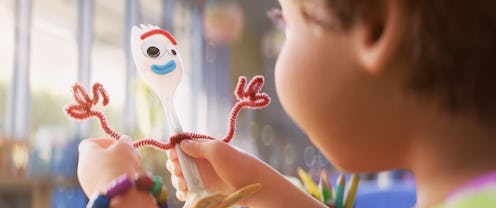Entertainment
This Confused New ‘Toy Story’ Character Poses Some Pretty Existential Questions

When does an everyday object become a toy? And what happens once it does? That's the existential conundrum presented by Toy Story 4, in theaters June 21 — the next installment of an animated series that's always had a bit of a cerebral and sad undercurrent. There's one new character in particular who has to deal with his own change, simultaneously challenging veteran toy Woody's entire existence. Toy Story 4's Forky (voiced by Tony Hale), a sort of found-materials artistic creation, was inspired by a childhood experience that's pretty universal, according to the filmmakers.
"The creation of him just came from looking at our own kids. They do play with the box the toy came in more than the toy sometimes, and they do go to school and create things," director Josh Cooley tells Bustle during a visit to Pixar Animation Studios. "And what happens to those things? Would it come to life if they played with it? The answer is yes."
As seen in the first trailer, Forky is a far cry from the classic craftsmanship of Woody and the flashy plastic design of Buzz. He's created by Bonnie — the little girl who inherited Andy's toys in the last movie — at her kindergarten orientation, partially from a used spork. The rest of him is made up of pipe cleaners, googly eyes, glitter glue, popsicle sticks, soft clay, Wikki Sticks, stickers, and crayon — all things you can find in a classroom full of children. But the thing is, it doesn't matter what he's made from. Bonnie falls in love with him, and boom: toy.
"Story-wise," producer Jonas Rivera clarifies in a press conference, it's actually Bonnie writing her name on Forky that brings him to this new life.
But the Toy Story movies are all about purpose, Cooley says, and Forky hasn't come to terms with his new one yet. This means that he's a total wildcard, whom the other toys have to wrangle. "It makes it a little dangerous for the toys who know to lie down when Mom or Dad or someone comes into the room," Rivera says. "He doesn’t care. So he’s really a tangle in the works that we thought was interesting."
What was surprising to the filmmakers was how millennials instantly connected to Forky's confusion about literally everything. In the preview footage that was screened for us, Forky's repeated insistences that he is "trash" got the biggest laughs out of the visiting press. We recognized his panicked words as a common internet declaration of feelings of worthlessness or devotion to a fandom —very 2019. That was a just a coincidence, however.
"When the first trailer came out, all he said was, 'I don’t belong here!' and all of a sudden, people were like, 'I get this character,'" Cooley says with a laugh. "But the great thing is, I kind of feel like that too at times, so it was, in a way, all of us feel like outcasts, so we all relate on that."
The idea, however, came from the creativity and resourcefulness of children. And Forky helps to differentiate Bonnie, who may be a little more artistic, from Woody and Buzz's previous owner. "We’ve long established Andy and how he plays, his play patterns, how he imagines, and how the toys fit into that," Rivera says. "And what we wanted to do with her... even though you might land on your feet and be in another kid’s room, every kid is different." So despite her room full of toys, Bonnie gets very attached to Forky — probably because she imagined him up herself.
Forky is a totally original creation, but Pixar animators needed some real-life inspiration. During the development of the character, the team got together in crafting workshops to design their own take on the character — making Forkys with their own two hands. Animator Claudio De Oliveira tells us that he had to swipe a few extra sporks whenever he'd go to a pizza place, just so he could work on a physical manifestation of Forky at home. And when he took Forky back to the studio with him, his wife and children texted to say that they missed him.
That just goes to show that the movie's thesis is true: when you love something, it becomes real to you. (Velveteen Rabbit-style.) And maybe, eventually, that'll change how Forky sees himself too.
This article was originally published on